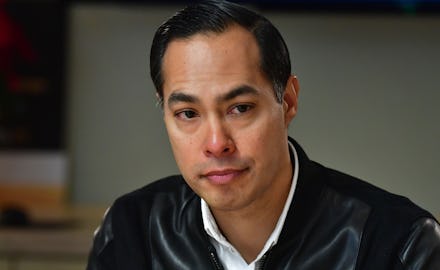Julián Castro, who challenged Democrats' commitment to diversity, drops out of 2020 race

Julián Castro, the former secretary of housing and urban development, suspended his presidential campaign Thursday, leaving a whiter and older Democratic primary field in his wake. Castro posted an almost four-minute-long video on his social media channels to announce the end of his campaign, per The New York Times. “I’ve determined that it simply isn’t our time,” Castro said in the clip.
The video featured a montage of highlights from Castro’s time on the campaign trail. He was seen saying the names of victims of police brutality and calling for the decriminalization of border crossing. He also thanked his supporters and encouraged them to follow their dreams. The former mayor of San Antonio, Texas, also promised to keep working towards his own goals.
“I’m not done fighting," Castro declared. “I’ll keep working towards a nation where everyone counts, a nation where everyone can get a good job, good health care and a decent place to live.”
Castro’s departure marks the end of a campaign that lagged in the polls and struggled with fundraising. As the only Latinx person in the race, as well as his background working in President Barack Obama's administration, Castro had the makings of a strong presidential candidate. However, he was never able to gain momentum — and he increasingly called out how he believed he was subjected to more scrutiny than his older and whiter counterparts. As the 45-year-old Castro noted last month, electability is the monkey on the backs of candidates of color and women.
“The worst thing we can do is to make assumptions or use some cookie-cutter formula about who ought to be the nominee of the party,” he told BuzzFeed News in May. “History tells us, especially in the modern era, that Democratic presidential candidates — who we think is the most electable candidate isn’t necessarily the case.”
Castro doubled down on this point when California Sen. Kamala Harris dropped out of the race in early December.
“To me, they held her to a different standard, a double standard, to other campaigns," Castro explained to BuzzFeed News last month, noting how "from very early on" Harris was criticized for having "no Black support." "It’s just holding people to different standards," he said.
Castro also called out the arrangement of the Democratic primary calendar, which positions two overwhelmingly white states as the first to vote. He praised those states — Iowa and New Hampshire — because they "vet the candidates, they show up at town halls, they give people a good hearing," but he believes the primary system discounts the demographic changes that have happened since the calendar was adopted in 1972.
"Demographically it's not reflective of the United States as a whole, certainly not reflective of the Democratic Party, and I believe that other states should have their chance," he said during an interview with MSNBC in November.
Castro reiterated this argument when he spoke to Vogue that same month, citing the party's tendency to heap praise on Black women when things go right.
“We can’t go around thanking Black women for powering Democrats to victory all over the country, and then at the same time hold our first caucus and our first primary in states that have almost no African-Americans,” he said. “We’re right to call Republicans out when they suppress the votes of African Americans or Latinos, but we’ve also got to recognize that this 50-year-old process was created during a time when minority voices had zero power in the party.”
The effect of race on the current field is debatable given that, as Intelligencer's Eric Levitz pointed out, Castro has struggled to resonate with nonwhite voters. Pointing out the candidate's extremely low polling average, Levitz wrote, "To state the obvious: It is not possible to poll that low in a Democratic primary if you have significant support among nonwhite voters."
Nonetheless, Castro's argument opens up a discussion of how to prioritize nonwhite voters and their interests in this election year. And by portraying the Democratic machine as at odds with the diverse voters who make up its party, Castro is explicitly reflecting some unkind truths about the Democratic Party on the national stage.
It's a talking point that will linger well beyond his candidacy, and it was a characteristically strong one. Despite his position in the polls, Castro was one actually of the leading progressive candidates in the field, despite that label going more commonly to Sens. Bernie Sanders and Elizabeth Warren.
He was also unafraid to stand toe-to-toe with more “electable” candidates, as in the September debate, when he called out former Vice President Joe Biden for seemingly contradicting himself during a discussion about Medicare for All. About three months before that, Castro scolded former Texas Rep. Beto O’Rourke for not calling for the elimination of Section 1325 of the Immigration and Nationality Act, which criminalizes crossing the border without proper documentation, according to CNN. At the time, O'Rourke was a buzzy primary contender, though he eventually exited the race in November.
Castro’s departure brings to mind a warning he gave the Democrats last month regarding diversity. Although he doesn’t want skin color to be a determining factor for the nomination, Castro said a line-up of white people “doesn’t help us."
He urged his party to revamp its approach to courting voters of color.
“I’m not asking for anybody to change the rules of the game in the middle of it. I want something more meaningful and deeper than that. You need to change the whole game."